
Ranking Difficulty & Chance Score Now on AppTweak
We’ve added two new indicators to our ASO Keyword Analysis tool that will help you more immediately identify which keywords are more easy to rank for and for which words your app has a higher chance of reaching top ten results. Meet our Difficulty and Chance score.
3 indicators to consider when choosing your app’s keywords.
When you’re doing your keyword research, it’s important to carefully pick the keywords you’ll ultimately add to your app. We generally recommend taking these 3 elements into account:
- Keyword relevancy: this should be the number one criteria in your keyword selection. You want to make sure that each keyword you pick is truly relevant to your app and that users who search that keyword, have a high chance of being interested in your app.
- Keyword Volume: Of course, it’s important to take the volume of a keyword into account, if your app ranks n°1 on very low volume keywords, you won’t be driving any traffic to your app.
- Keyword Difficulty: if you’ve found a very relevant keyword with high volume, don’t forget to check its difficulty. It’s no surprise that high volume keywords are the most competitive ones, with very powerful apps ranking in top results. These keywords are very difficult to rank on in top positions, that’s why balancing volume and difficulty is key. You’d rather rank n°1 on a relevant keyword with a medium volume, than n°50 on a very popular keyword.
More insights on how to perform an in-depth ASO keyword research
These three elements generally work against each other, making it tough to find the right equilibrium between all 3. The more specific and relevant a keyword is, the more likely users that perform such a search will convert on your app. However, the less general the keyword is, the lower its volume, which reduces your reach.
To illustrate, we compared the volume and rank of Fishdom on the keywords “games”, “match 3 games” and “fish game”. As the word becomes more specific and relevant to the game’s universe, the volume decreases but Fishdom manages to rank better each time.
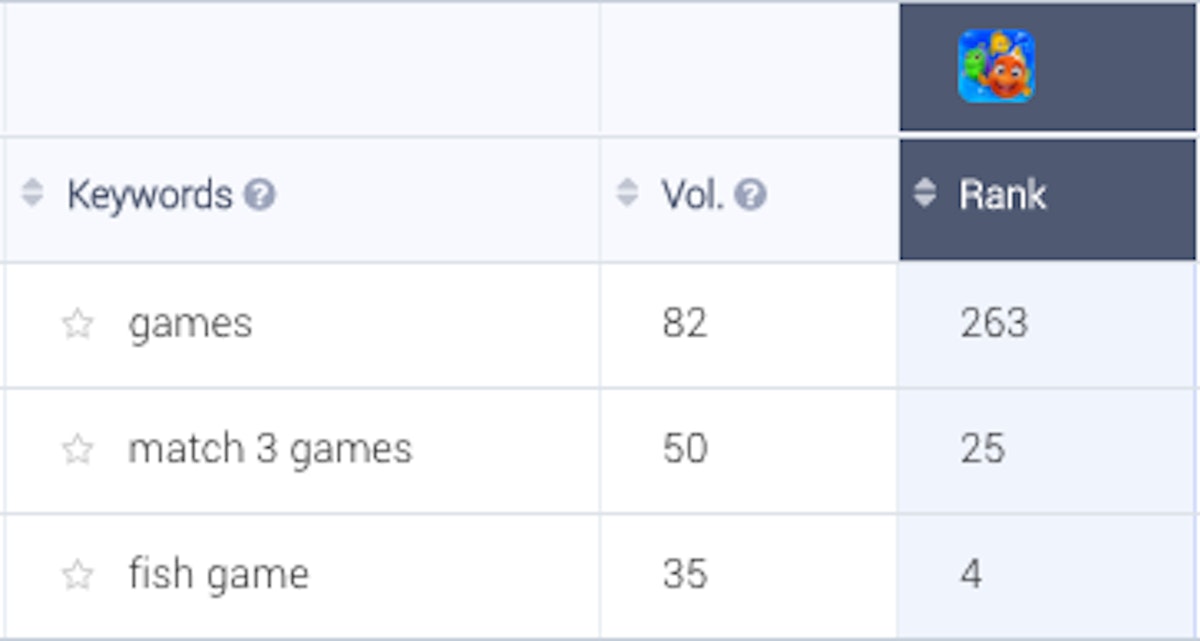
Comparing the impact of relevancy on volume and rank with Fishdom (iOS US)
Regarding difficulty, more specific keywords will probably have a lower difficulty and your app will have a better chance of reaching top results. However, you want to make sure the space isn’t already taken by very powerful apps, and have an idea against who you will be competing beforehand.
For instance, who would have thought that “pizza delivery” is actually a more difficult keyword than “food delivery”? or that, although “Alcohol delivery” has a lower difficulty than “pizza delivery”, it actually has a much higher volume!
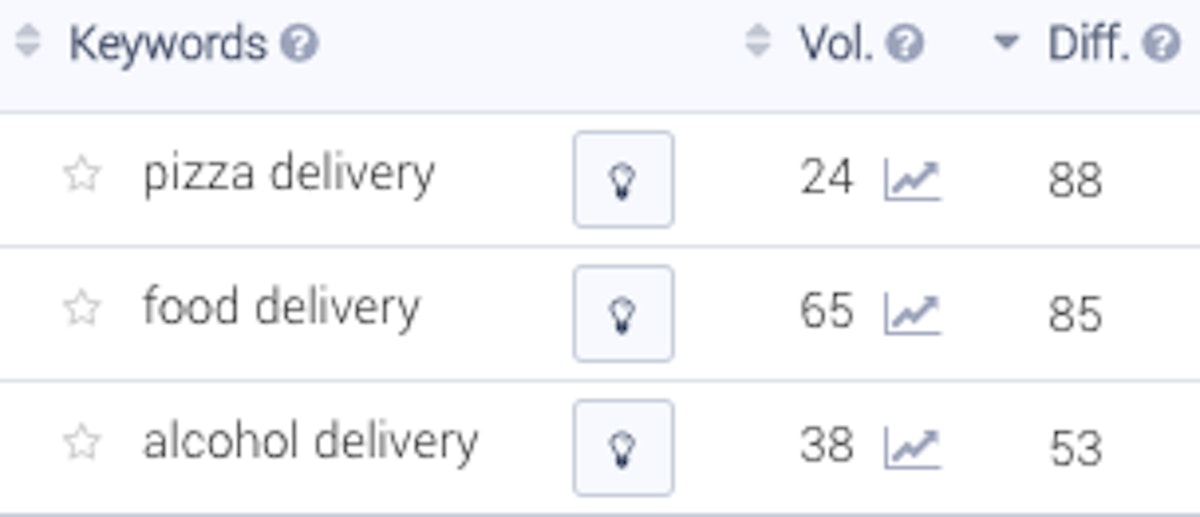
Comparing Volume and Difficulty on delivery keywords.
Measure the Difficulty of a keyword on the App and Play Store
In your ASO routine of choosing the best keywords for your app, you want to put aside the keywords that are too competitive, or for which there are already very powerful apps ranking on, so that you can focus on the keywords your app actually has a chance to rank in top results. Remember our golden rule: you’d rather rank n°1 on a lower volume keyword than 50 on a very popular word.
In order to get an idea of how difficult a keyword is, we look at the Top 10 apps that rank on that word and at their App Power. If the apps all have a very high App Power, then competition will be tough, and your app will need many downloads to rank in top results for that keyword. On the other hand, if the App Power of the apps that rank in the Top 10 results of the keyword are all pretty low, then that’s probably a keyword that isn’t too tough to rank on.
Learn more on how we measure the App Power
As an example, we compared the difficulty of the keywords “ride” (volume of 42) and “taxi” (volume of 49) and found that the keyword “ride” has a higher difficulty, meaning that the apps that rank in top 10 results have a higher App Power than those that rank on “taxi”. In other words, as a new app, competition is easier on the keyword “taxi” than on the keyword “ride”, plus, “taxi” has a better volume!
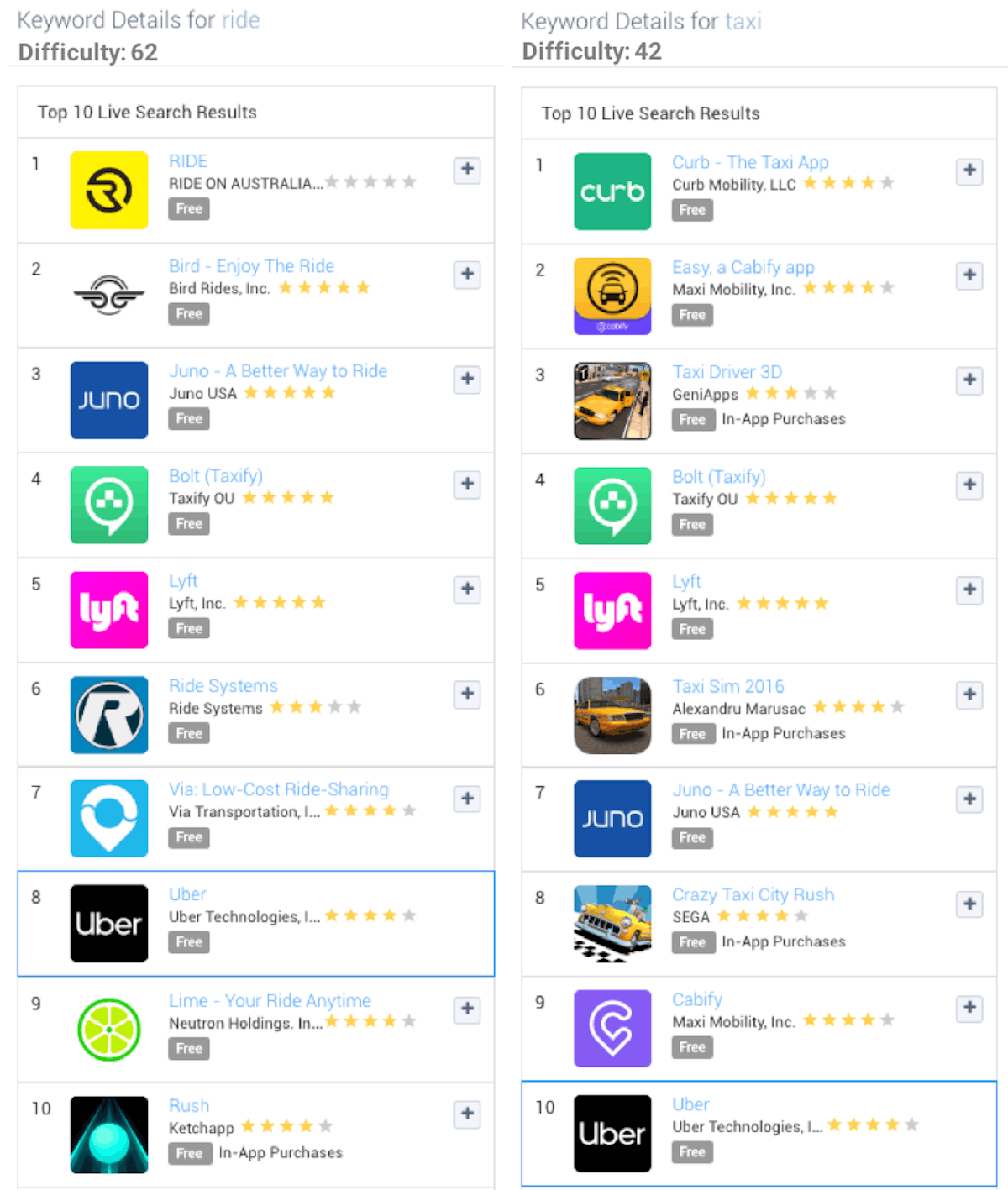 Comparing Live Search of the keywords “ride” and “taxi” – iOS US
Comparing Live Search of the keywords “ride” and “taxi” – iOS US
When considering the Difficulty index, always check if the keyword is branded or not as that could mislead you into targeting branded words. For instance, the Difficulty of the keyword “waze” is at 47, indicating that it’s a keyword not that hard to target. However, since it’s a branded term, it will be difficult for you to target that keyword unless you add to your app’s metadata, which is prohibited by the Apple App Store and the Google Play Store.
Our two-cents on Brand vs. Generic keywords in your app title
Know in advance your app’s Chance to rank on a keyword
Using both the difficulty of a keyword and your app’s App Power, we can calculate the chance your app has to rank on a keyword. In other words, before deciding which keywords to add to your app’s metadata, we show you the keywords for which your app has a better chance to rank in top results.
Higher up, we suggested that targeting keywords with a high difficulty wasn’t the best strategy if you want your app to rank in high positions. However, that directly depends on the power of your app. If your working on an app that drives many downloads on the Store, it might actually have a chance to rank among the top results of difficult keywords. That’s what our Chance indicator is all about. We compare your app’s App Power with those of the apps that rank on a given keyword and tell if your app has a chance to compete against them.
How to identify your app’s most visible competitors
We looked at the Search Ads Recommended Keywords of two Chat applications for workspaces with very different App powers, and then ordered the words by chance to see on which keywords each app had a better chance to rank. Slack had several keywords with a very high Chance, most with a very good Volume. Wire has very few keywords with a Chance above 50 and many with a volume 5.
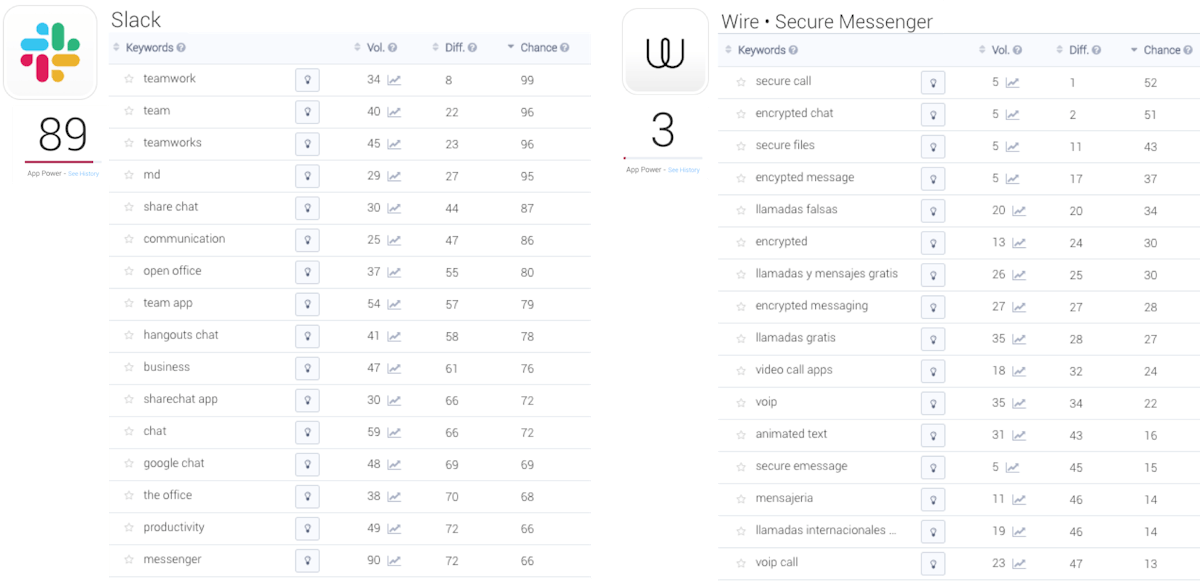
Looking at the keywords for which two different Business Chat apps have the highest chance to rank on.
As your app grows and gains visibility on the Store, you will be able to target higher volume keywords and compete against bigger apps. Of course, in order to rank on a keyword, you need to add that keyword to your app’s metadata. Keywords for which your app has a high chance to rank on should only be considered if they are relevant and if it makes sense to add them to your app’s profile.
Monitor your app’s performance on a keyword and measure its impact!
Choose the most efficient keywords for your app
The Chance is a great indicator to show you keywords for which you have the best chance to rank in top results (if you start targeting that word in your metadata), however, it doesn’t take volume into account. As you can see the example above with Wire, the top 4 keywords with the best chance all had a volume of 5, which is the equivalent of nearly no traffic.
In order to take volume into account, we decided to edit our Keyword Efficiency Index (KEI). The KEI is calculated using the volume of a keyword and your app’s chance on that keyword. Keywords with a high KEI are keywords with the best combination of high volume and high chance. Those are most likely to be efficient keywords for your app. So the KEI is sort of the ultimate indicator for your ASO research. Of course, you mustn’t forget the relevance, the keywords you add should always be linked to your app’s universe and what it does.
If we take the same two apps as above and the same keywords lists, but order the words by KEI, the results are slightly different, bringing in some nice new insights.
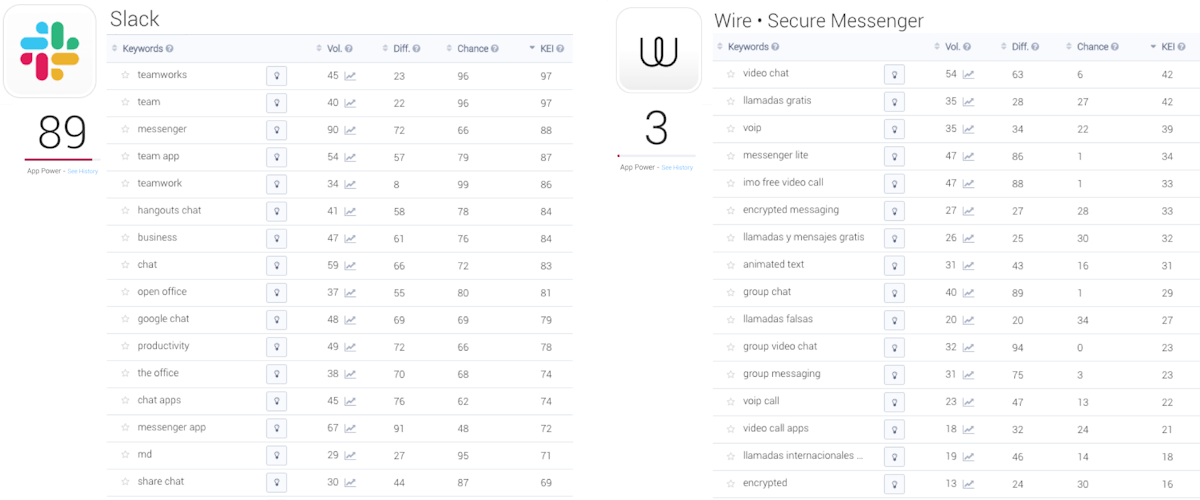 Comparing the most efficient keywords of two different Business Chat apps.
Comparing the most efficient keywords of two different Business Chat apps.
Pssst! check out this other great indicator: n°installs monthly per keywords
Pick the best keywords for your app!
Now that you know all about our new indicators, you have all you need to really deep dive into your keywords research and find those keywords that will bring your app’s visibility to the next level! To sum up:
- Volume: find the keywords that drive traffic
- Difficulty: avoid keywords that are too competitive
- Chance: focus on those your app has a chance to rank on
- KEI: pick the most efficient ones with the best combinations of other indicators



 Micah Motta
Micah Motta

 Georgia Shepherd
Georgia Shepherd
